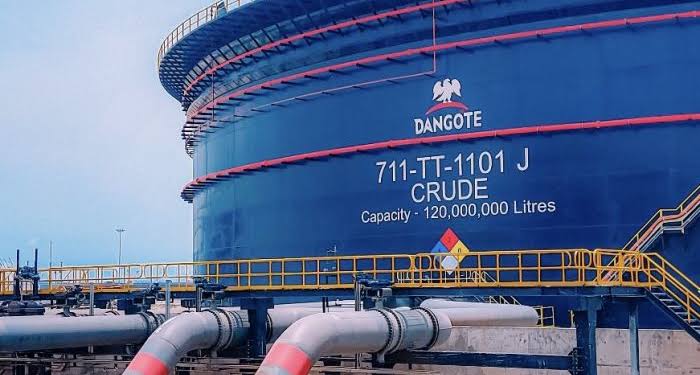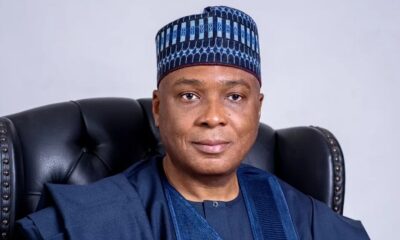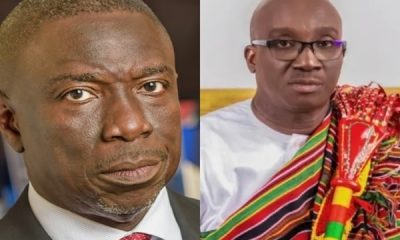Economy
Dangote’s fuel supply will aid economic revival – Governor reveals

Ogun State Governor, Dapo Abiodun, said the commencement of fuel production by the Dangote refinery will strengthen the nation’s economy by eliminating constant shortages and conserving foreign exchange.
Petrol produced from the 650,000 barrels per day Dangote refinery is expected to hit filling stations in the next 48 hours as modalities with the Nigerian National Petroleum Company Limited have been formalised.
Abiodun, in a statement on Tuesday signed by his Chief Press Secretary, Lekan Adeniran, said that with the refinery coming on stream, one of the most significant challenges faced by Nigeria for more than three decades—reliance on fuel importation—will be solved.
According to the statement, with the Warri and Port Harcourt refineries also being prepared to begin production, Nigerians will heave a sigh of relief from constant fuel shortages, while the economy will also receive a boost.
Abiodun praised Alhaji Aliko Dangote for his determination to see through the multi-billion dollar projects against all odds.
The governor also commended President Bola Tinubu for his intervention in ensuring that the refinery came on stream during his administration.
He praised the President’s commitment to the revitalisation of other refineries in the country, which, he said, will drastically reduce fuel prices when all of them start production.
Abiodun said: “This significant achievement marks a transformative milestone not only for you as an entrepreneur but also for Nigeria and the broader African continent.
“The establishment of this refinery represents a pivotal shift in the energy landscape of the region, showcasing the power of vision, resilience, and unwavering commitment to economic development.
“The Dangote refinery is poised to be a game-changer in the production of petrol, addressing one of the most pressing challenges faced by Nigeria: reliance on imported fuel. This dependency has not only strained our foreign exchange reserves but has also hindered our potential for self-sufficiency.
“By producing petrol locally, the refinery will drastically reduce the outflow of foreign currency, thereby strengthening our economy. This move aligns perfectly with the President Bola Tinubu-led administration’s efforts to achieve economic diversification and reduce reliance on oil exports alone.”
Similarly, the governor said the economic impact of the refinery extends beyond just fuel production, saying that it is expected to generate thousands of jobs, both directly and indirectly, thus contributing to the reduction of unemployment rates.
“The ripple effect of this employment generation will invigorate local economies, stimulate growth in ancillary industries, and enhance the livelihoods of countless families across Nigeria.
“In addition to bolstering local employment and economic activity, the refinery’s operations are expected to enhance energy security in Nigeria. With the capacity to produce a substantial volume of petrol, the country will be better equipped to meet its energy needs, reducing the volatility associated with fuel shortages and price fluctuations.
“This stability will inevitably create a more favourable environment for businesses and attract foreign investments, further boosting economic growth.
Economy
More Nigerians to experience poverty by 2027 – World Bank

The World Bank’s latest Africa’s Pulse report has projects a grim future for Nigeria, with poverty expected to rise by 3.6 percentage points by 2027.
Released during the IMF and World Bank Spring Meetings in Washington, DC, the report cites Nigeria’s reliance on oil, economic fragility, and governance challenges as key drivers.
It highlights the country’s structural economic weaknesses, dependence on oil revenues, and national fragility as key barriers to meaningful poverty reduction.
“Poverty in resource-rich, fragile countries, including large economies like Nigeria and the Democratic Republic of Congo, is projected to increase by 3.6 percentage points between 2022 and 2027,” the report stated.
Despite recent growth in Nigeria’s non-oil sector during the last quarter of 2024, the World Bank warns that this progress is unlikely to translate into widespread poverty alleviation due to ongoing fiscal and institutional challenges.
The report emphasizes that Sub-Saharan Africa remains the world’s poorest region, with an overwhelming 80% of the globe’s 695 million extreme poor residing there in 2024.
Within the region, half of the 560 million extremely poor people were located in just four countries, including Nigeria.
In stark contrast, South Asia accounted for 8% of the world’s extremely poor population, East Asia and the Pacific 2%, the Middle East and North Africa 5%, and Latin America and the Caribbean 3%.
The World Bank attributes the rising poverty in Nigeria and similar economies to weakening oil prices and fragile governance structures, noting: “This follows a well-established pattern whereby resource wealth combined with fragility or conflict is associated with the highest poverty rates, averaging 46% in 2024, which is 13 percentage points higher than in non-fragile, resource-rich countries.”
Meanwhile, non-resource-rich countries in Africa are experiencing stronger economic growth and faster poverty reduction, buoyed by high agricultural commodity prices and more resilient fiscal policies.
To reverse Nigeria’s downward poverty trend, the World Bank recommends reforms that prioritize inclusive economic growth and stronger public financial management.
It calls on the government to focus on “improving fiscal management and building a stronger fiscal contract with citizens to promote inclusive economic development and long-term poverty alleviation.”
Economy
SEE current exchange rate of the Dollar to Naira

What Is the Dollar to Naira Exchange Rate at the Black Market (Aboki FX)?
Here is the Dollar to Naira exchange rate at the parallel market, popularly known as the black market (Aboki fx), for Tuesday, April 23, 2025.
You can exchange your dollars for naira at the following rates:
Black Market Exchange Rate (Lagos – April 23, 2025):
According to sources at the Bureau De Change (BDC), the exchange rate at the Lagos parallel market saw traders buying at ₦1610 and selling at ₦1620 per US dollar.
It’s important to note that the Central Bank of Nigeria (CBN) does not recognize the black market. The CBN advises individuals seeking foreign exchange transactions to do so through their banks.
Dollar to Naira Exchange Rates
Market Type Buying Rate Selling Rate
Black Market ₦1610 ₦1620
CBN Official Rate ₦1591 (Low) ₦1606 (High)
Note: Forex rates vary across dealers and regions, and actual rates may differ from those listed.
Meanwhile, the Nigeria Customs Service (NCS) has announced the seizure of 298 smuggled items worth ₦7.6 billion between January and March 2025. The NCS also disclosed that it generated a total revenue of ₦1.75 trillion in the first quarter of the year.
Economy
Volvo announces termination of 800 U.S. workers, cites tariff, market decline

Volvo Group has announced plans to lay off up to 800 workers at three of its U.S. facilities over the next three months, citing ongoing market uncertainty and declining demand exacerbated by tariffs introduced under the administration of President Donald Trump.
The affected locations include the Mack Trucks plant in Macungie, Pennsylvania, as well as Volvo Group sites in Dublin, Virginia, and Hagerstown, Maryland.
In a statement on Friday, Volvo Group North America confirmed that between 550 and 800 employees would be impacted.
The company, a subsidiary of Sweden’s AB Volvo, employs nearly 20,000 people across North America.
The layoffs come amid wider turmoil in the automotive and manufacturing sectors, as shifting U.S. trade policy and a series of tariffs continue to drive up production costs. Economists have pointed to the uncertainty surrounding Trump’s trade strategy as a factor undermining both business and consumer confidence, with concerns mounting over a potential economic slowdown or recession.
According to Volvo, the company is grappling with a decline in heavy-duty truck orders, driven by instability in freight rates, anticipated regulatory changes, and the growing financial burden of tariffs. “We regret having to take this action, but we need to align production with reduced demand for our vehicles,” a company spokesperson stated in an email quoted by Reuters.
Volvo’s announcement marks another blow to an industry already navigating a complex web of supply chain challenges and fluctuating market conditions, with other manufacturers also warning of potential cost hikes and disruptions tied to global trade disputes.
-

 News15 hours ago
News15 hours ago2027: Pro-Fubara protesters want suspended Gov to run as Atiku’s VP(Video)
-

 Economy22 hours ago
Economy22 hours agoMore Nigerians to experience poverty by 2027 – World Bank
-

 News17 hours ago
News17 hours agoOborevwori /Okowa: PDP experiencing a rebirth and will soon bounce back-Saraki declares
-

 Politics22 hours ago
Politics22 hours agoLabour Party reaffirms Abure-led leadership after Supreme Court judgment
-

 News22 hours ago
News22 hours agoGovernor Oborevwori’s Defection: A Masterstroke That Handcuffs Delta’s Opposition
-

 News22 hours ago
News22 hours ago2027 done deal, more governors joining APC – Ganduje declares
-

 News15 hours ago
News15 hours agoEdo poll: How APC allegedly offered witnesses N30m bribe
-

 News15 hours ago
News15 hours agoFlights resume as NiMET unions suspend strike






